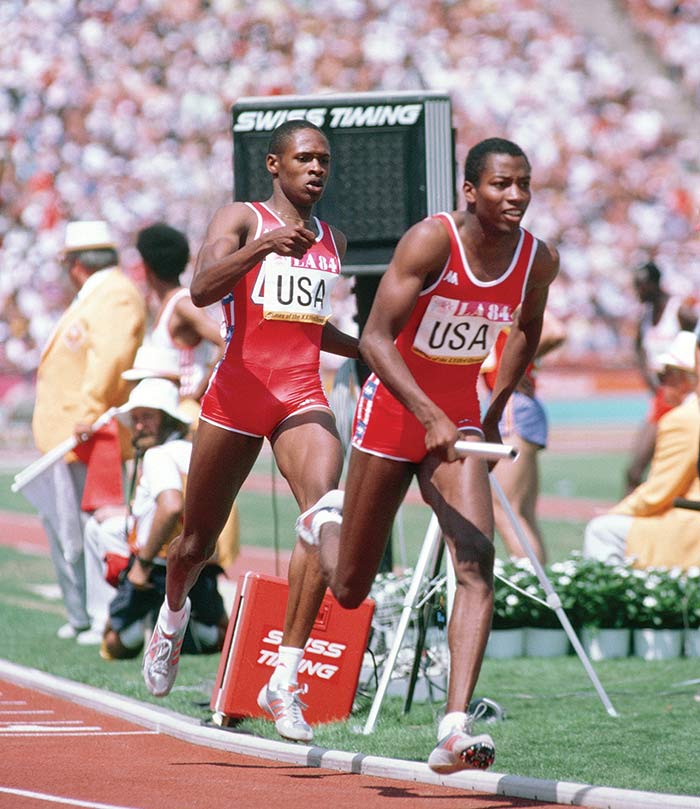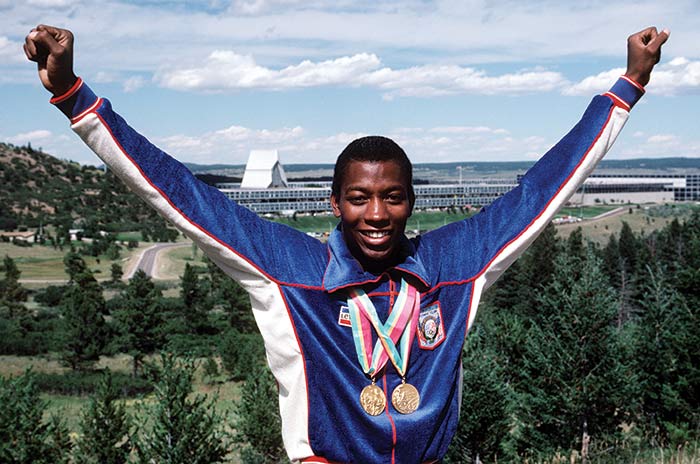Our Stories: Going for Olympic Gold
By John Perkinson, Senior Staff Writer

As part of the U.S. men’s 4 X 400 meter relay team, Alonzo Babers takes the baton on the third leg of the race, winning a gold medal along with his teammates.
On a sunny day in Los Angeles, Calif., 32 years ago, F/O Alonzo Babers (United) put everything he had on the line. “I remember feeling like I had a really good chance of winning,” he said, but the odds-on favorite was fellow U.S. runner Antonio McKay. At the sound of the race gun, the seven competitors burst forth with Australian Darren Clark taking and holding the lead for nearly three quarters of the race. However, Babers surged ahead during the final stretch and, with a time of 44.27 seconds, won the men’s 400 meters race at the 1984 Summer Olympics.
“I remember crossing the line and looking up at the screen to see the time, thinking, ‘Oh my gosh; I just won the gold medal!’” said Babers. “Having the entire stadium go crazy for something I had accomplished was just amazing.”
On August 11, three days later, the U.S. men’s 4 x 400 meter relay team trailed the Australians at the race’s midpoint. With the baton firmly in his hand for the third leg, Babers blazed past his competition, taking the lead and improving upon his previous gold-winning performance with a 43.75-second sprint. Babers later stood with his three teammates atop the award podium to receive his second gold medal.

Alonzo Babers displays his two gold medals from the 1984 Summer Olympics.
Babers ran track in high school in Montgomery, Ala., where he was born, but running was not his only passion. The son of an Air Force chief master sergeant, he was also fascinated with flying. “Living on an Air Force base, I had a lot of exposure to airplanes and decided that flying would be a cool thing to do,” he recalled. After a discussion with his high school counselor, Babers decided to apply to the U.S. Air Force Academy.
While at the academy, Babers tried out for the football team and made the cut as a wide receiver. “In my second game, which was against the University of Wisconsin, I caught a pass across the middle, got hit by a linebacker, and broke my arm. That was the end of my football career,” he chuckled.
However, Babers also ran track, competing in various events. By his senior year, he set the academy record for the 400 meters as well as the 300- and 500-yard races. He graduated a two-time NCAA All-American and was later inducted into the Air Force Academy Athletic Hall of Fame as part of its inaugural class in 2007.
Babers graduated from the Air Force Academy in 1983 but continued to run, competing at the Pan American Games and later the World Championships in Helsinki, Finland—doing so as a lieutenant. Babers reported for flight training school shortly after the Olympic Games and remained an active duty officer in the Air Force from 1983 to 1991. He continued to fly with the Air Force Reserve Command (the 756 Airlift Squadron) until 2004. In 1992, he became a pilot for United Airlines and is currently based in Washington, D.C., where he flies B-777s.
Looking back at his Olympic experience, Babers said he really enjoyed hanging out with the other athletes in the Olympic Village. “One thing I regret is that I didn’t attend the opening ceremonies,” he noted. “I chose to stay at home and train until my events started.”
The Air Force grad acknowledged that he was initially disappointed that the one Olympics he would run in was hosted by the United States. Babers had hoped to travel to some exotic, distant locale for this once-in-a-lifetime event. However, he soon changed his mind when he ran for the first time before a home crowd. “There’s nothing like having 90,000 people cheer for you every time you step onto the track.”
Soon after the Olympics, Babers met U.S. President Ronald Reagan. He attended a special reception at the Pentagon in Arlington, Va., and a tickertape parade in New York City. He also received the key to the city of Montgomery as well as the key to the city of Colorado Springs, Colo., where he went to college. He chose to end his competitive running career just months after receiving his two gold medals. However, his remarkable accomplishments achieved during those two brief weeks in August 1984 will forever be etched in Olympic history.

